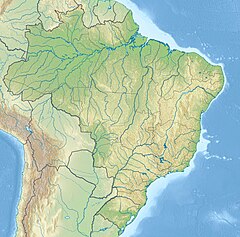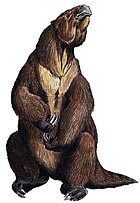Ahytherium: Difference between revisions
Appearance
Content deleted Content added
navbox |
removed misrepresentation in news item; all of that is supposed to be based on the description paper, which is referenced |
||
| Line 9: | Line 9: | ||
}} |
}} |
||
'''''Ahytherium''''' is an extinct genus of [[megalonychid]] [[sloth]] found in [[Brazil]].<ref name= "AhytheriumPB">{{cite web | title = ''Ahytherium'' in the Paleobiology Database | work = [[Fossilworks]] | url = http://fossilworks.org/cgi-bin/bridge.pl?a=taxonInfo&taxon_no=137589 | accessdate = 2020-01-16}}</ref><ref>{{cite journal|last=Cartelle|first=C.|last2=De Iuliis|first2=G.|last3=Pujos|first3=F.|year=2008|title=A new species of Megalonychidae (Mammalia, Xenarthra) from the quaternary of Poço Azul (Bahia, Brazil)|journal=Comptes Rendus Palevol|volume=7|issue=6|pages=335–346|doi=10.1016/j.crpv.2008.05.006}}</ref> |
'''''Ahytherium''''' is an extinct genus of [[megalonychid]] [[sloth]] found in [[Brazil]].<ref name= "AhytheriumPB">{{cite web | title = ''Ahytherium'' in the Paleobiology Database | work = [[Fossilworks]] | url = http://fossilworks.org/cgi-bin/bridge.pl?a=taxonInfo&taxon_no=137589 | accessdate = 2020-01-16}}</ref><ref name=Cartelle>{{cite journal|last=Cartelle|first=C.|last2=De Iuliis|first2=G.|last3=Pujos|first3=F.|year=2008|title=A new species of Megalonychidae (Mammalia, Xenarthra) from the quaternary of Poço Azul (Bahia, Brazil)|journal=Comptes Rendus Palevol|volume=7|issue=6|pages=335–346|doi=10.1016/j.crpv.2008.05.006}}</ref> |
||
{{Location map| Brazil|lat_deg=12|lat_min=46|lat_sec=50|lat_dir=S|lon_deg=41|lon_min=09|lon_sec=02|lon_dir=W|relief=1|label=Poço Azul}} |
{{Location map| Brazil|lat_deg=12|lat_min=46|lat_sec=50|lat_dir=S|lon_deg=41|lon_min=09|lon_sec=02|lon_dir=W|relief=1|label=Poço Azul}} |
||
== Discovery and taxonomy == |
== Discovery and taxonomy == |
||
The almost-complete skeleton of ''Ahytherium'' alongside remains another extinct sloth species, ''[[Australonyx]]'', were discovered in Poço Azul, an underwater cave in [[Chapada Diamantina National Park]] in 2005. It was described by Castor Cartelle of [[Pontifícia Universidade Católica de Minas Gerais]]. |
The almost-complete skeleton of ''Ahytherium'' alongside remains another extinct sloth species, ''[[Australonyx]]'', were discovered in Poço Azul, an underwater cave in [[Chapada Diamantina National Park]] in 2005. It was described by Castor Cartelle of [[Pontifícia Universidade Católica de Minas Gerais]]. The bones, which had a length of about {{convert|3|ft|cm}} when put together, belong to an animal which presumably was still growing.<ref name=Cartelle/> |
||
== See also == |
== See also == |
||
Revision as of 14:37, 8 February 2021
| Ahytherium | |
|---|---|
| Scientific classification | |
| Domain: | Eukaryota |
| Kingdom: | Animalia |
| Phylum: | Chordata |
| Class: | Mammalia |
| Order: | Pilosa |
| Family: | †Megalonychidae |
| Genus: | †Ahytherium Cartelle et al., 2008 |
| Species: | †A. aureum
|
| Binomial name | |
| †Ahytherium aureum Cartelle et al., 2008
| |
Ahytherium is an extinct genus of megalonychid sloth found in Brazil.[1][2]
Discovery and taxonomy
The almost-complete skeleton of Ahytherium alongside remains another extinct sloth species, Australonyx, were discovered in Poço Azul, an underwater cave in Chapada Diamantina National Park in 2005. It was described by Castor Cartelle of Pontifícia Universidade Católica de Minas Gerais. The bones, which had a length of about 3 feet (91 cm) when put together, belong to an animal which presumably was still growing.[2]
See also
References
- ^ "Ahytherium in the Paleobiology Database". Fossilworks. Retrieved 2020-01-16.
- ^ a b Cartelle, C.; De Iuliis, G.; Pujos, F. (2008). "A new species of Megalonychidae (Mammalia, Xenarthra) from the quaternary of Poço Azul (Bahia, Brazil)". Comptes Rendus Palevol. 7 (6): 335–346. doi:10.1016/j.crpv.2008.05.006.



